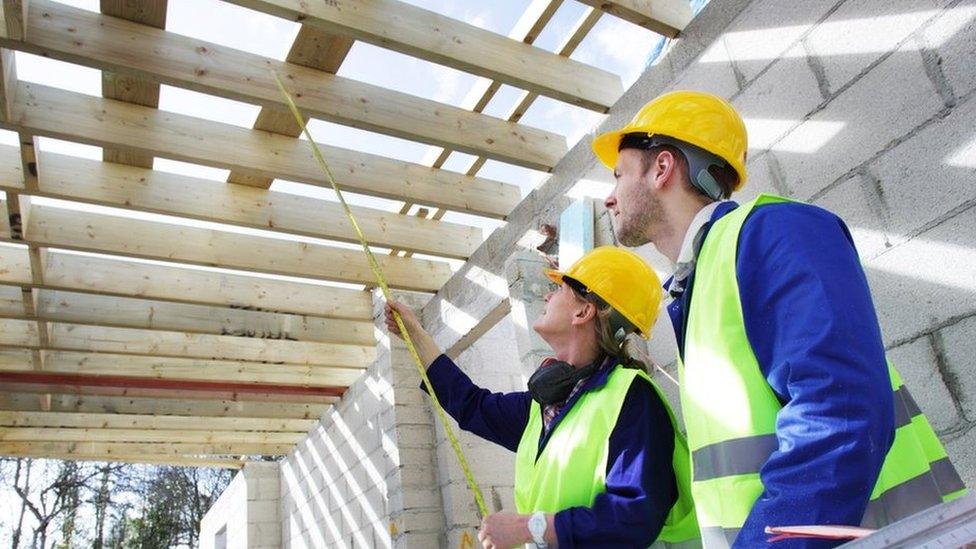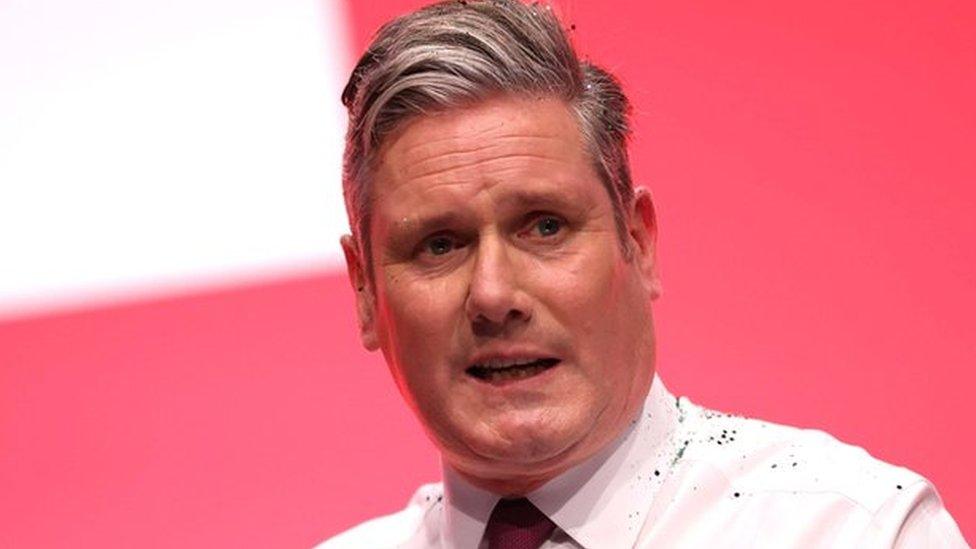Sir Keir Starmer says he is a house building Yimby
- Published
- comments
Sir Keir Starmer is a yimby, not a nimby, on housebuilding
Sir Keir Starmer has told the BBC he is a Yimby - "yes in my back yard" - because he is against blocking new homes being built in local areas.
The Labour leader would "bulldoze" restrictive planning rules and overrule local MPs to build more homes.
Sir Keir has pledged to build 1.5 million homes if elected.
Yimbys, the opposite of "not in my back yard" Nimbys, are pro-housing advocates who want building projects to start near them.
"Obviously we want to work with local communities," Sir Keir said, but added "we need to ensure planning goes up a level, so it is not localised".
Previous governments had been too fearful of local opposition to deliver the homes the country needs, Sir Keir said in an earlier interview.
Asked by BBC Political Editor Chris Mason if he was a Yimby, Sir Keir replied: "Yes."
"I think it is very important that we build the homes we need for the future," Sir Keir added.
He said that it was understandable that individual MPs would want to "stand up" for residents in their local areas.
But he added: "The role of government is obviously different. The role of government is to deliver on big projects."
As a backbench MP, Sir Keir spent his first years in parliament opposing HS2 entirely for the impact it would have on his central London seat of Holborn and St Pancras.
Speaking in the House of Commons, external months after being elected, Sir Keir told MPs he "opposed HS2 on cost and on merit".
"The impact of HS2 on my constituency—on residents, businesses and the environment—will be devastating," he added.
Starmer speech
In his speech to Labour's annual conference on Tuesday, Sir Keir promised that, if elected, Labour would deliver more homes to "build a new Britain".
The hour-long address, which was interrupted by a protester showering the Labour leader with glitter, came on the penultimate day of the four-day gathering in Liverpool.
The party has tried to use the event to showcase its offer to voters ahead a general election expected next year.
Sir Keir said a victory for Labour, which has a commanding lead in opinion polls, could herald a "decade of national renewal" after 13 years of Tory-led government.
At the heart of the speech was a plan to use dedicated state-backed companies to build a wave of new towns near English cities, echoing those built by Labour after the World War Two.
He also said he would restrict the ability of councils to stop developments on under-used urban land, where developers can meet the criteria in a new planning rulebook encouraging Georgian-style townhouse blocks.

Sir Keir has set a target of building an extra 1.5million new homes over five years if he is elected
In an earlier interview, Sir Keir said Labour in government would work to get the "balance right" between local concerns and the need to build new homes.
"We are going to have to do things that previous governments haven't done," he said, including "bulldozing away" restrictive planning rules.
"Otherwise, we'll end up where we are now, which is talking about housing - this is the story of the last 13 years - but not actually getting very much done."
'Bombproofed' target
The Labour leader has not said where or how many "new towns" it would build, saying it would run a six-month consultation inviting bids from councils.
Local authorities taking part would be able to put the affordable housing built towards meeting their housing quotas, under the party's plans.
Labour has set a target to build 1.5m homes in England in five years if elected, broadly matching the government's current ambition of delivering 300,000 new units a year from the mid-2020s.
Asked how Labour's plan was different, Sir Keir said it had accompanied its proposals with a "plan for delivery".
Adding that his commitments had been "robustly tested," he said he was only prepared to put "bombproofed" proposals before voters at an election.
Sir Keir Starmer leaves what could be the final Labour conference before a general election on a high note.
The mood among activists in Liverpool was upbeat but cautious, with senior figures warning against overconfidence.
Labour's top team appeared to avoid making any blunders that could help the Conservatives, ahead of what is likely to be a tough election battle.
Related topics
- Published10 October 2023
